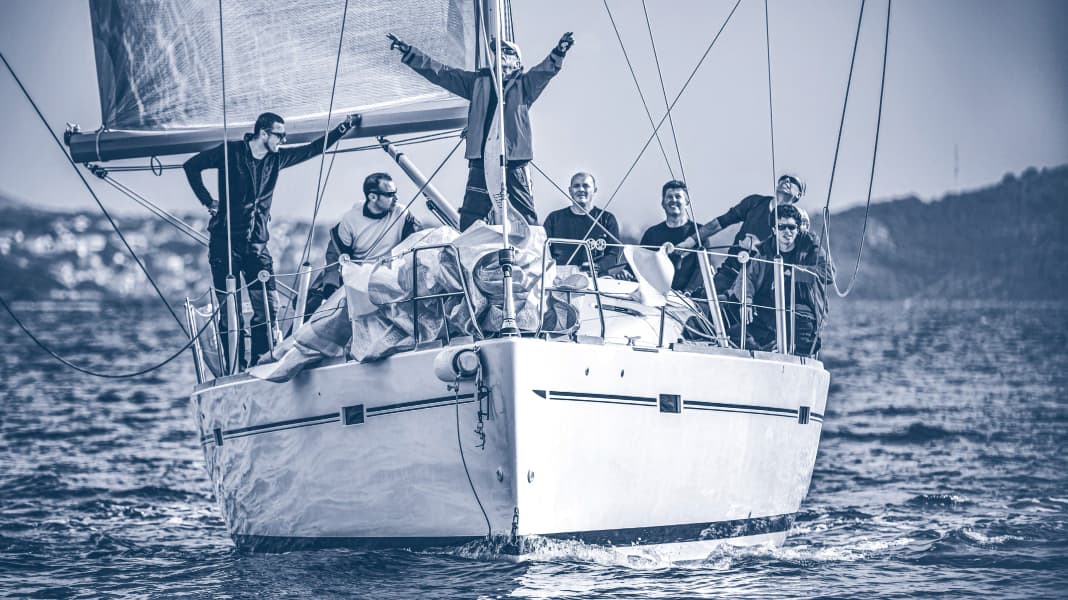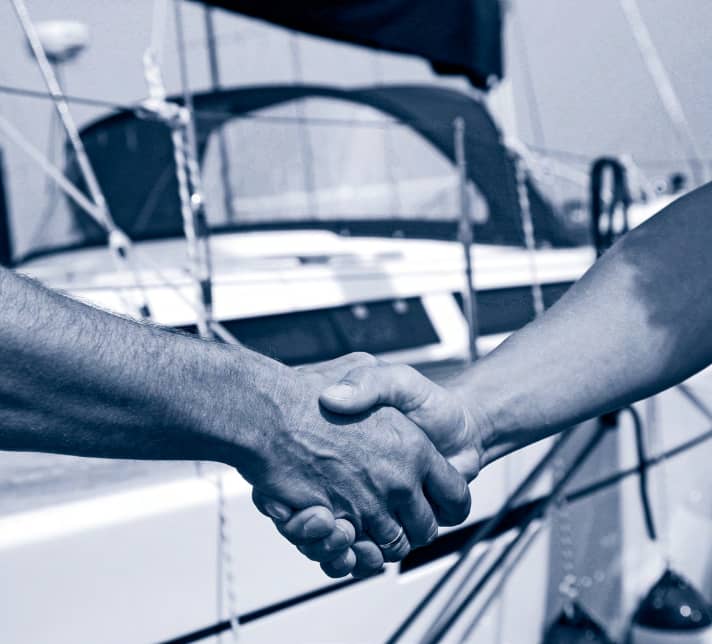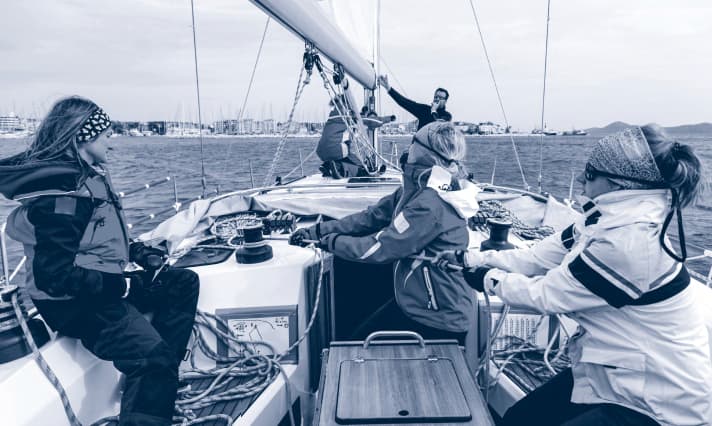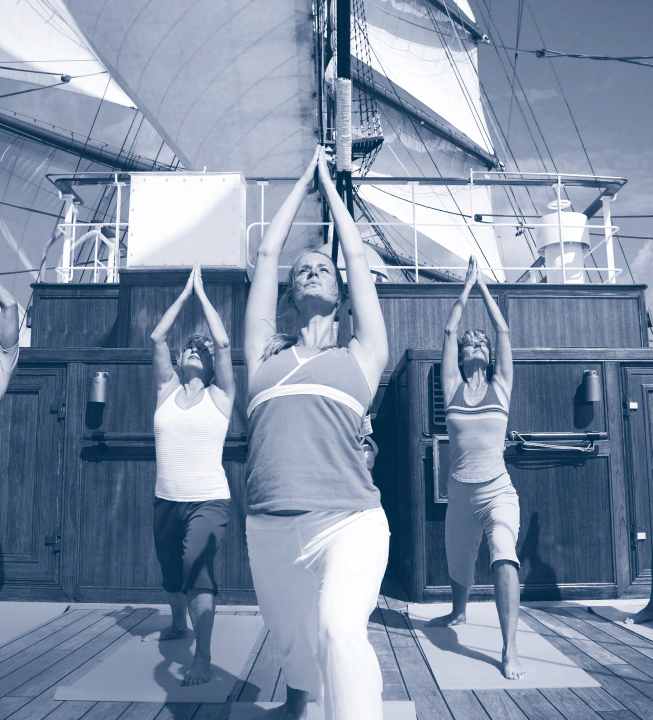
Marketing experts like to tell the following anecdote: A chain of Indian luxury hotels suffered from a lack of bookings during the rainy season and sought help from a large English advertising agency. Their boss came up with an ingenious plan. She created the word "monsoon yoga" and told the hotel managers to offer appropriate courses during the rainy season. No sooner said than done, a yoga programme was put together, photos were taken, journalists were flown in, the advertising drums were beaten. And bang, the customers came, turnover increased - allegedly by over forty per cent.
Examples of similar magic are well known - although it is always language that is used for cheeky exaggerations. In the course of such tuning procedures, bosses have become CEOs, marriage counsellors have become relationship managers, hairdressers have become hairstylists, bank advisors have become asset and wealth consultants. You know the drill.
The world of sailing - previously known more as an elementary and not so easy to impress field of activity - is increasingly getting caught up in the maelstrom of this proliferation. In some places, the good old sailing school has become the Sailing Academy, and in addition to classic charter trips, relaxation trips to the Caribbean or deluxe sailing holidays including a yoga retreat at sea can be booked. As if that wasn't enough, there is now also "coaching" on board that will make your jaw drop.
It probably all began with the aerobics boom of the 1980s, when Jane Fonda turned up in sexy clothes and reinterpreted the sports session as a work-out, tights as leggings, stretching as a move and hopping as a cardio session. From then on, the sports teacher was called a trainer - and soon became a personal coach. However, this was a novelty. The previously purely linguistic transformation suddenly turned into tangible offers that have enriched our everyday lives ever since. And there are more and more of them.
Well, the world hasn't got any easier. In times of fake news, rampant individualisation and all kinds of disruptive trends, life can become confusing. So it's understandable that personal counselling is in demand at various levels. When it comes to life advice, there is hardly anything that doesn't exist: Nutritionists, style advisors, conflict counsellors. Under the magic word "coaching", the offers are even more extensive: Career coaching, life balance coaching, business health coaching, OKR coaching (Objectives and Key Results), process-orientated coaching for managers and targeted development of potential for blocked managers.
Four years ago, Claudia Voigt wrote in Der Spiegel: "I don't know how it could happen that the so-called coaching culture has spread worse than a flu virus. Probably because there is no vaccination against it." Even worse: instead of growing, many a counsellor would turn into a "narrow-minded personality".
Perhaps we shouldn't take such a harsh view of all this. Ultimately, it's a form of modern service that anyone can use, but doesn't have to - unless they are ordered to do so by their superiors. Here, people simply want to share their experiences in order to earn a living.
It remains to be seen whether we will end up in a sea of slogans or actually gain new insights into all sorts of things and perhaps even ourselves. As is usually the case in life, it depends on the quality of the offer and the neediness of the demand. But if the diaspora of coaching providers now also discovers sailing and conquers the vastness of the seas, then we can at least frown for a moment.
And seriously ask: really now? In fact, our hobby is currently being hit by a flood of sophisticated coaching programmes. This starts with the purchase of a boat: anyone looking for a yacht today can, for example, book a targeted "boat buying coaching" programme to prepare them for the meeting with the boat and the seller in a three-hour conversation. Whether this ultimately replaces an expert or the advice of an experienced sailing enthusiast - nobody knows in advance. In any case, the provider advertises with the plausible sentence: "We'll tell you what you need to prepare for intensively and what unpleasant questions you need to ask the seller to avoid unpleasant surprises."
Orientation talks of this kind have always existed. Whether you have to sell classic buying advice as coaching is a question of taste and nowadays probably also owed to internet search engine optimisation. However, it becomes much more creative when the old sailing and the new coaching are combined to form "Happiness Training Academies". It is astonishing to read: "Sailing and coaching is a particularly intensive form of personal development. On the high seas, we use the analogy between steering a sailing boat and steering your own life."
The provider does indeed recognise enormous potential in sailing. No one in the coaching sector seems to be doing anything less than that anyway. The declared goals of the joint trips are not exactly narrow-minded: "Take the helm and change the world. To develop life with inspiration and enthusiasm. Recognising patterns and having the courage to create an extraordinary life and creatively realise dreams."
Not bad, Mr Specht. But hasn't sailing always offered all this? An elemental experience? An adventure? Seamanship? Setting off for new shores? And this too: a little school of life?
In any case, all the coaches have had one thing carefully drummed into them at their own coaching seminars: "Never call yoga in the rain yoga in the rain. Call it monsoon yoga!" However, the seven days of sailing around Malle are also available for €2,250, plus €300 that goes into the on-board coffers. With eight participants, that makes 20,400 euros per week for the provider, regardless of whether he is a skippering coach or a coaching skipper. But well, a sailing yacht costs money.
If you want to put such grandiose-sounding offers on the scales in advance, you should take a quote from language pope Wolf Schneider to heart. He once said: "With pompous verbiage, experts arm themselves against the suspicion that they might not have anything special to say."

"Do you really need a boat buying coach to buy a yacht these days? Why should it no longer be enough to consult an expert - or trust the opinion of a friend with sailing experience?"
One question that arises in all of this is why it is sailing ships of all things that have recently been used in droves as life optimisation ships. Is the wind to blame? Do the paraffin lamps glow so beautifully in the evening? Or do the selfies get better when the boat is heeling? "Cast off!" says another offer. "Secure your ticket to freedom." And further: "Your sailing journey is the beginning of a great development. Inspired by this guiding principle, I will accompany you on your personalised coaching journey under sail with a tailwind to your destination."
Various techniques previously learnt by the coach - and which are now being used high up in the wind - are intended to help: systemic work. Experience with NLP. Transactional analysis. Remote viewing. The inside of communication.
There is now almost no end to this type of offer: portfolio managers, financial analysts, nature coaches, consultants and mentors of all kinds can now be found imparting their knowledge at seminars under sail. Insiders have identified over thirty coaching trends that dominate the market. Many of them are now also playing out on yachts.
"Sailing with depth" is the name of a multi-day coaching programme on board, developed for experienced managers who want to use the "intensive setting to deal with the specific issues of their day-to-day management work". Reason: "The special conditions on board optimally support the coaching process." Another aspirant offers "leaderSHIP sailing for managers and teams", the next one offers resilience training on the Baltic Sea, the one after that resilience training on Lake Constance. Motto: "Sail yourself strong - ways to inner strength and responsible self-control".
Almost everything can be found at the fair of maritime life coaches: "individual or duo coaching on a sailing boat", "team building on a yacht", "women's sailing coaching for more gender diversity", "systemic coaching at sea" including "outplacement counselling". Men are sent on "Marriage Cruises" in the Mediterranean, while young professionals are sent on "Sail & Coach" trips to the Caribbean. In Holland, team building and "mindfulness training on a sailing ship" is sold on the IJsselmeer to "experience moments in our lives more consciously" by means of "meditation, awareness and light movement exercises".
The boundary between boating and coaching must now be seamless. The sea as a teacher, the boat as a school, the sailing coaches as lecturers on the lost content of life.

Now it's easy to make fun of trends. Especially when they come across so streamlined. But there are certainly a few nice experiences to be had in today's conglomeration of self-optimisation trips. After all, what could be nicer than escaping for a week or two, switching off on holiday and experiencing exciting and new things on a sailing yacht? You're out on the water, smelling the wind. You get to know other people, have to lend a hand and spend the night in a bunk. Marvellous!
The only question is: what's so new about it? How dare the ladies and gentlemen coaches cover the good old sport of sailing with this kind of droning? Sailing ships have always been good teachers, and the sea has never been despised as a stage for self-awareness. On sailing ships, you have always been able to look up at the sky and reflect a little on life and yourself. You had to limit yourself a little and sometimes had to weather a storm. On the other hand, there were always new shores ahead and you could experience extremely inspiring moments when the boat was safely back in the harbour after a windy day full of nautical miles and the crew drank a manoeuvre beer together.
This is what sailing has largely been about - for a good century. Until now, it has rarely featured varnish monkeys on a life balance trip. Sales managers throwing around pompous wisdom had as much to lose on deck as a banana skin. At wind force six at the latest, the drivel comes to an end.
And if it really was about something as big as self-awareness or broadening horizons, then sailing was always meant quite seriously. Wilfried Erdmann, for example, did this when he sailed solo around the world twice, each time spending a year alone at sea. Others have long been aware of the wealth of experience inherent in sailing and have always endeavoured to share this with others. This involved seamanship and solid sailing practice in the narrower sense, but also a form of life education in the broader sense. This begins with opti-sailing, the classic introduction to the sport since the 1950s. Children are still learning to sail in the little soapboxes today - and much more besides. Reading gusts, capsizing, righting the boat. Jibing, tacking, luffing, falling off. Yes: the tots learn to steer - also in a figurative sense.
And, keyword "lend a hand": sailing has always meant taking care of the material yourself. Boat maintenance, winter work, sanding, varnishing, replacing sea valves and handling sheets. This alone is a portion of self-awareness, without being sold as enlightenment coaching. After all, sailing has known and taught this for decades: You have to get your hands a little dirty before your spirit glides animatedly across the sea and through life. No pain, no gain.
The sailing clubs probably know this best. They have always promoted young talent, equipped youth cutters, organised trips and flotillas, and taken interested novices on board. Adults who want to learn to sail can obtain various licences, book charter trips and get their own logbook. Anyone who then fills this with miles is likely to have a lot of fun and gain some experience to boot. Nautical matters, the sea, cloud formations, the ship, the crew, the courses, the interpersonal peculiarities on such a boat and possibly also a bit of self-exploration. Without a coaching preacher sitting under the Mediterranean sun and psalmising about life plans.
The fact that sailing ships are suitable for teaching both external and internal skills has been known since venerable square-riggers set sail in the early 20th century and the boring term "training ship" was coined. However, the destination was rarely Palma or a week in Croatia, but rather: to give the cadets a leg up and make the young sailors fit for life at the same time. The "Schulschiff Deutschland" is one example, the "Gorch Fock", the "Nordwind" - along with dozens of other internationally renowned training ships that are still under sail today.

There have probably always been one or two units of wind and wisdom on board, not always without lasting psychological traces. But anyone who came up with "inner engineering" or "self-maximisation strategies" for the captain here could have spent the next ten thousand nautical miles peeling potatoes.
The fact that sailing ships can even be used as vehicles for education, training and social work was recognised in the 1990s, when boats such as the "Undine" set sail with young people from difficult backgrounds to offer the poor devils new prospects. For its youth work, Hamburg-based "Gangway e. V.", for example, operated an old two-masted schooner for over two decades, which was taken out to sea for six months at a time. On board: pedagogically trained sailors and employees who wanted to give the young people a chance.
According to the association: "By living and working together on board, the young people got to know themselves anew as people with diverse skills and strengths and at the same time received basic nautical training as deckhands and thus an option for a professional perspective (in the harbour, on inland or coastal motor ships, etc.). In addition to work, school was an integral part of the daily routine."
It can sound like that too. And that's how it sounded thirty years ago. Learning for life - in front of the mast. Seriously. For six months. Across the rough North Sea. And the only thing that inflated were the sails. The film "White Squall" is a monument to sailing ships as floating educational establishments. In the film, the training ship "Albatross" sets sail to cruise the Caribbean for a year. On board are twelve young people who are under the strict regiment of Captain Sheldon, played by Jeff Bridges. The story is not just about sailing and blue bays, but above all about camaraderie, discipline, decency and morals. In short: a journey into growing up.
But the toughest test is yet to come: the ship is caught in a hurricane. It sinks, four people drown - whereupon the captain has to answer to the maritime court and risks losing his licence.
Which brings us to a point that comes first when sailing - far ahead of all well-intentioned life-enrichment measures: safety on board. In other words, the qualifications and experience of the skipper and the seaworthiness of the ship. No matter how well a sailing yacht is marketed as a centre for coaching sessions of all kinds, nobody should confuse it with a seminar room, a school, a wellness hotel or a yoga temple. This is especially true when not only family and friends are on board, but also paying guests. People who dream of the promise of sailing, but who may never have set foot on a ship before.
When the wind and waves rise, the fun stops in a flash. It is then no longer about "acceptance and commitment" therapies, such as those offered by the "Life Coaching Retreat under Sail" under the motto "The Little School of Valuable Living". In a storm, it's simply about getting safely ashore. At worst, it's about not sinking.
Participants in leadership training at sea can then experience first-hand what stress management, decision-making and team building mean. And only hope that the skipper and coach are suitably equipped in such a situation. The "coachees", as the participants of such trips are now called, should therefore do their utmost to find out in advance who they are actually going out to sea with. In other words: Is this a serious offer in terms of seamanship?

"Sailing with depth or with a tailwind for life - many self-proclaimed coaches have no shortage of maritime metaphors for untangling knotted souls"
The German Sailing Association (DSV) and the Ship Safety Division of the German Social Accident Insurance Institution for the transport industry have clear ideas in this regard. Accordingly, every commercially operating skipper - whether they also act as a coach or not - should have professional skipper liability insurance in addition to the usual licences and proof of experience. The vessel should also have a licence from the BG Verkehr. In short: anyone who takes on the nautical responsibility for guests on a sailing yacht should also be able to bear this responsibility. If this is the case, you can set sail with confidence. Cast off. Set sail. Set sail. Ahoy, ahoy! Feel the great freedom, unwind and soak up wisdom until the spar cracks. The whole programme.
If the assembled life coaches on board then know how to not just talk about solutions where there are no problems and, on top of that, practise using halfway normal language, it can even be really good. Then let's go sailing and enjoy it! Or in new German: Coach me if you can!

Marc Bielefeld
The 56-year-old journalist and author from Hamburg lives and works either on his boat on the Mediterranean or in Hamburg. He regularly writes reports and portraits for YACHT (see page 40). His most recent book "Logbook of Passion" was published by Delius Klasing

Marc Bielefeld
Freier Autor

